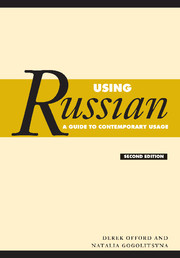Book contents
- Frontmatter
- Contents
- Preface to the first edition
- Preface to the second edition
- Acknowledgements
- Sources
- Note on transcription, stress marks and transliteration
- Glossary of linguistic terms
- List of abbreviations
- 1 Varieties of language and register
- 2 Passages illustrating register
- 3 Problems of meaning: Russian words
- 4 Problems of translation from English into Russian
- 5 Vocabulary and idiom
- 6 Language and everyday life
- 7 Verbal etiquette
- 8 Word-formation
- 9 Inflection
- 10 Prepositions
- 11 Syntax
- 12 Stress
- Index of Russian words, phrases and affixes
- General index
10 - Prepositions
Published online by Cambridge University Press: 05 June 2012
- Frontmatter
- Contents
- Preface to the first edition
- Preface to the second edition
- Acknowledgements
- Sources
- Note on transcription, stress marks and transliteration
- Glossary of linguistic terms
- List of abbreviations
- 1 Varieties of language and register
- 2 Passages illustrating register
- 3 Problems of meaning: Russian words
- 4 Problems of translation from English into Russian
- 5 Vocabulary and idiom
- 6 Language and everyday life
- 7 Verbal etiquette
- 8 Word-formation
- 9 Inflection
- 10 Prepositions
- 11 Syntax
- 12 Stress
- Index of Russian words, phrases and affixes
- General index
Summary
It is worth devoting a separate chapter to Russian prepositions, and the rendering of English prepositions into Russian. For one thing, knowledge of prepositions in a foreign language tends to be a good indicator of command of that language in general. More importantly, the meanings of Russian prepositions coincide with the meanings of their most common English equivalents only to a limited degree. Russian prepositions are also extremely precise in their meanings. The English-speaker must therefore think particularly carefully about the meaning of the English preposition in a given context before rendering it into Russian. Moreover, some of the most widespread English prepositions (e.g. for, of, to, with) are often not rendered in Russian by any preposition at all, since their meaning may be implicit in the use of a certain Russian case. Attention must also be paid to the fact that some common Russian prepositions are capable of governing more than one case and that they have different meanings when they are used with different cases.
This chapter examines the most important meanings of Russian and English prepositions respectively, and also lists common verbs that govern an object indirectly through a particular preposition. The last section (10.4), which deals with the rendering of each English preposition in Russian, draws attention to expressions in which usage in the two languages is quite different.
- Type
- Chapter
- Information
- Using RussianA Guide to Contemporary Usage, pp. 333 - 376Publisher: Cambridge University PressPrint publication year: 2005



